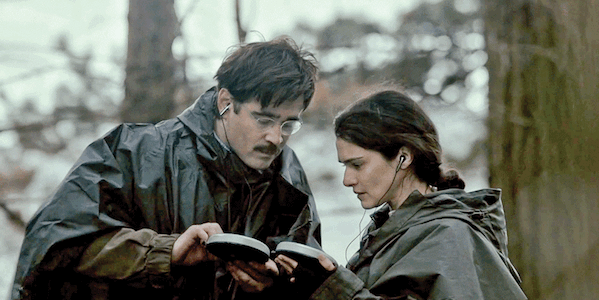Swipe Left: Modern Dating In THE LOBSTER

Liam Ball is a 23 year-old film graduate who regrets…
Director Yorgo Lanthimos first grabbed the world’s attention with Alps and the seismic Dogtooth. Recently, he sprung another biting, absurdist satire into the festival circuit with The Lobster. It takes place in a world in which relationships are mandatory; the characters, all newly single, or newly of age, are detained in a hotel that works, basically, as a deadly speed dating service. The residents have 45 days to find love, or they’ll be transformed into an animal of their choosing, banishing them from society good and proper.
Modern love
Beyond critiquing society’s wider structural failings as in Lanthimos’ previous films, The Lobster’s main target is modern interaction and modern dating habits. The dawn of such services as eHarmony and Tinder has meant that often, couples come together in ways that seem a million miles away from the fumbling awkwardness of When Harry Met Sally or Annie Hall. They emerged concurrently with their neighbouring Internet genre – the social media platform – and despite being met with initial sideways glances and apprehension, online dating sites are now being accepted as a social norm.
But as with social media platforms, online dating has met its fair share of criticism. It’d be unfair to call this criticism Luddite, but it expresses a similar concern: the loss of humanity in social interactions. The Lobster takes this point of view from its first post-credits scene: the hotel manager puts David (Colin Farrell) through twenty questions on his sexual preferences in the most deadpan way imaginable.

Throughout the film, barely any of the actors allow their voices to rise above a monotonous drone. Their expressions rarely betray even a semblance of emotion. Like with online interaction, expression is difficult to decipher through written language alone, and so the characters in The Lobster talk as though they were life-sized text-to-speech generators. There is no actual mention of the Internet at any point, but everyone acts like a web proxy. It’s almost as though The Lobster is taking place in a post-Internet world where web behaviour has changed face-to-face interaction.
The hotel itself is established as a similarly sterile dating environment. There’s a precision to its rules and regulations that, in an absurdly comic way, recalls the way users have to register for online dating services: the information is often binary, and rather limited in terms of stated preference. In his preliminary meeting, for instance, David is told he cannot list his sexuality as bisexual or bi-curious, only heterosexual or homosexual.
What’s love got to do with it?
At these early stages, the film presents such a notion as inherently humorous. It illustrates its personified version of online dating as simply weird. It’s jarring to see the hotel residents being forced to introduce themselves by stating only two or three of their characteristics. The aptly named “Limping Man”, Ben Whishaw’s character, talks predominately of how one of his legs is shorter than the other, and how he thinks this makes him charming. It’s reminiscent of the self-branding involved in online dating, wherein users must promote themselves to other date seekers by publishing their most attractive attributes.

On that, the film also seems to comment on the inevitable unreliability in such actions. Limping Man picks up the habit of smashing his nose against things to feign chronic nosebleeds, which he does to fake a similarity to a fellow guest he’s attracted to. As such, online daters can only know what a user’s profile says about a person. With the expressionless guests wandering the hotel with a clear lack of cognition, the same goes for the characters in The Lobster.
Indeed, the hotel’s algorithm seems to be as reductive as any real life computer system’s would. But that isn’t the only moment where the film suggests our modern habits are conflicted. Masturbation is prohibited in the hotel, and punishment comes in the form of painful humiliation (i.e. having your hand forced into a toaster). The hotel maids even grind their backsides against the male guests’ laps – while still forbidding climaxes – to make them more desperate to find a partner.
Labelling loneliness
This is where the film twists its satire from the absurdism at the beginning to purely cynical; it doesn’t take long for the switch to happen. As in real life, pornography and masturbation carries a stigma in The Lobster. Yet, forced relationships are not – in contrast with our era of encouraged free will. The open-ended argument this presents is not rounded up until the setting change, when David leaves the hotel after a bloodthirsty altercation with a fellow resident.
Joining a band of singletons camped just outside the hotel, David surrenders his lawful obligation to marry. He becomes a disciple of Loner Leader (Léa Seydoux), a cold and unforgiving woman who prohibits any form of relationship whatsoever within her gang of recruits. As David is forced to abide by the label of “loner”, just as the hotel’s residents are forced to abide by their labels of “lawful citizens who must get married”, The Lobster establishes its overarching theme of status, which is first instigated in the registration scene.

The way the film would have it, online dating and social media culture are societies determined by labels. Mutability and free will are completely surrendered in favour of an identity indicated by descriptors. “Single” and “in a relationship” are labels that each carry their own set of connotations that the characters in The Lobster must commit to. In this, the film is criticising the information age (in that Luddite-esque fashion mentioned earlier) for relegating human nature to ones and zeroes.
Life, it suggests, will become binary and staid if we continue to categorise ourselves within that magical filing cabinet known as the Internet. Especially if we continue to live our lives by the descriptors we subscribe to.
Conclusion
While the Internet ostensibly provides a gateway to free will, Lanthimos’ argument in The Lobster is that the opposite has happened. Human beings continue to assemble in posses and cliques, only there are more of those, and they’re more inclusive.
Keeping in mind that the fear of missing out and ‘Facebook depression’ are legitimate concerns for, reportedly, thousands of social media users, and considering that the loners in The Lobster are literally hunted, there’s a sinister truth in what Lanthimos is arguing. Restricting human interaction to information codes and algorithms means we lose out on the fumbling, magical meet-cutes of Before Sunrise and Roman Holiday.
Lanthimos is asking, however brutally, whether that’s the world you really want to live in.
Do you agree with Lanthimos? Is online dating ruining the concept of relationships?
Does content like this matter to you?
Become a Member and support film journalism. Unlock access to all of Film Inquiry`s great articles. Join a community of like-minded readers who are passionate about cinema - get access to our private members Network, give back to independent filmmakers, and more.
Liam Ball is a 23 year-old film graduate who regrets to inform you that he lives in the north of England. He's been writing about film since 2013, contributing here and there as one often does, and is currently preparing a research proposal on Ozploitation (or 'Australian horror, action, and exploitation cinema', if you're not into the whole brevity thing). He becomes irrationally angry towards anyone who says bad things about Clueless.













